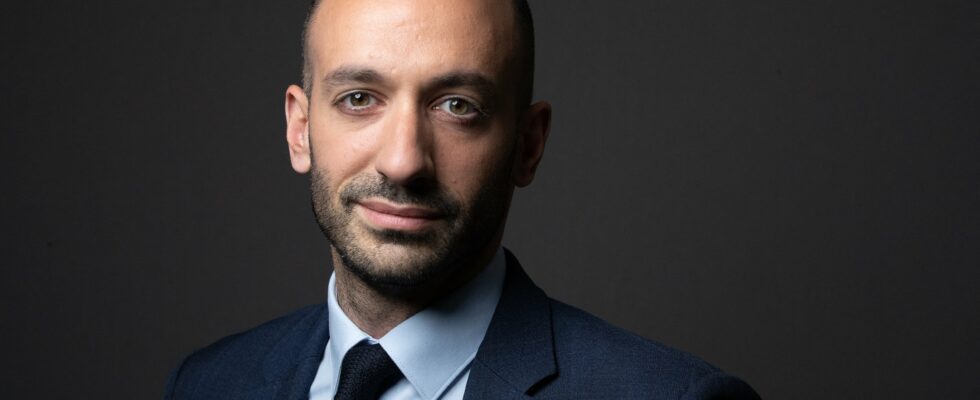Watching, this October 13, the hypnotic images of the recovery of Starship, Elon Musk’s rocket, Benjamin Haddad felt a little pinch. “Like the Americans discovering their backwardness in 1957, after the USSR sent a satellite into orbit, the Europeans are today experiencing their Sputnik moment,” he sighs. Two weeks before the American election, L’Express went to survey the new Minister Delegate for Europe. How does this good connoisseur of the United States, who worked for a long time in Washington, see the transatlantic relationship evolving? And what should Europe expect after November 5?
First of all, an observation – severe. Our continent continues to lag behind the United States. The numbers are relentless. In a quarter of a century, we have lost 15 points of GDP growth compared to the Americans. “The Draghi report clearly shows our loss of productivity and competitiveness, whether in the number of patents filed or in our ability to create start-ups in artificial intelligence, space or quantum,” underlines Benjamin Haddad. The question is this: can we still influence the great balances of the world?
Show teeth
Nothing is lost, but the battle will be tough. With the Chinese, of course, but also with the “American friend”, who, whatever the outcome of the presidential election of November 5, will not do us any favors – as evidenced by the American tax reduction law. inflation (2022), which is detrimental to European industry.
So, time for realism! Europe must show its teeth. Knowing how to “enter into evil”, said Machiavelli. To do this, she must change software. “While Beijing subsidizes its electric cars and Washington imposes 100% customs duties on their imports, we have struggled for months to only tax them at 36%, he fumes. Europe must stop seeing yourself as a vast market or as an NGO that defends universal values, but think of yourself as a political object, which has its own economic and security interests.” We are far from it. Thus, Brussels has long considered itself a champion of regulation. But is it really? And for what result? “The one who sets the standard is the innovator, not the one who decrees it.” In this case, Tesla or Apple, more than Brussels…
Reinventing the transatlantic relationship
A researcher for almost six years in two American think tanks (Hudson Institute and Atlantic Council), Benjamin Haddad, 39, trained in Sciences Po-HEC, defends the idea of a “transatlantic relationship to be reinvented”, subject of all the more significant as the current alliance is in the process of disintegrating. “When he gets up in the morning, the American president does not think about Europe. And in the Washington Post, the news from our continent often only arrives on page 32… We must understand that the Americans are turning their backs on us.” This is the famous Asian pivot, initiated by Barack Obama in 2011, and which , although slowed down by the war in Ukraine, has never been called into question since.
Certainly not, in any case, by Donald Trump who, during his turbulent mandate (2016-2020), showed disdain and total disinterest for the Old Continent. And we already know what will happen to the transatlantic link if he is re-elected… But let’s make no mistake. A Democratic victory will not guarantee us unwavering support from the “American ally” either. “Unlike Joe Biden, the last representative of an Atlanticist generation very marked by the Cold War, Kamala Harris does not consider that the relationship with Europe is central.”
In this perspective, the Twenty-Seven are strongly invited to ensure their own security. Although… Seeing the knee-jerk reaction of the Americans when their European partners, French in the lead, talk to them about “strategic autonomy”, we can wonder about Washington’s real desire to let Europe emancipate itself! “There is, it’s true, an American schizophrenia on this subject,” recognizes Benjamin Haddad. “It finds its origins in a certain conservatism, which dates from the 1990s. Remember Madeleine Albright, then Secretary of State, worrying about the risks of redundancy that a European defense cohabiting with NATO would constitute. This ambivalence can also be explained by the intense lobbying exerted on the Member States by the American defense industry. Washington to have access to the European Defense Fund, endowed with 7 billion euros…”
But how, faced with an increasingly aggressive Russia, and when certain countries, including Germany, do not have efficient armies, could the Old Continent ensure its security alone? “Let us combine the ‘pessimism of intelligence with the optimism of will’, to use the words of the Italian philosopher Gramsci, he replies. Let us create coalitions capable of involving our partners, like an Estonia which , while being very committed to NATO, proposes to launch a large loan of 100 billion euros.”
Mobilize savings
After all, Europe has always been forged in crises – as evidenced by the common debt of 800 billion euros, during the Covid crisis, which materialized in a recovery plan. “If we consider that the current economic decline and our defense imperatives also constitute existential crises, then we must mobilize savings – public, but also private – and, finally, unify the capital markets” , suggests Benjamin Haddad who, since his arrival at the Quai d’Orsay, has also led other, more French projects. He thus wants to strengthen the French presence, which he considers too weak, in major international events. “If you knew the number of times where, in important conferences, I was the only French person present… It traumatized me! So I asked my teams to list the major forums of the coming year, in order to to ensure a significant presence there in terms of influence, it is fundamental. Like our German neighbor, much better organized than France – and often more effective – in terms of lobbying, thanks to its powerful private foundations.
.
